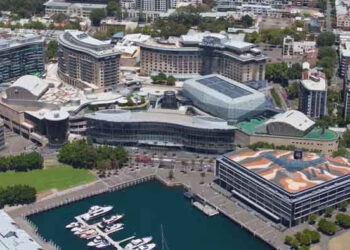Melco Crown Entertainment reported a healthy 19% increase in gaming revenue for the first quarter, a gain achieved largely on the strength of the mass-market business that is believed to be at risk from a reported government crackdown on illicit UnionPay transactions by mainland Chinese gamblers.
“We haven’t seen any negative impacts with regards to business,” said co-Chairman Lawrence Ho.
Melco, a dual-listed joint venture between Mr Ho’s Melco Group and Australia’s Crown Resorts (Nasdaq: MPEL/HKSE: 6883), beat consensus with US$1.35 billion in net revenue and generated a 31% jump in EBITDA to $388 million as one of the territory’s leaders in the high-margin mass sector, particularly in the higher-stakes segment known as “premium mass”.
This was reflected in the results, which showed a 3% drop in VIP rolling chip volume at the company’s Altira and City of Dreams resorts, while combined drop at the cash tables grew 25%, generating a 42% increase in mass gaming revenue and surpassing the 39% growth recorded market-wide over the period.
Machine gaming revenue, which includes the company’s Mocha slot parlors, grew 21%, more than doubling the pace of growth of the market as a whole.
Net income for the quarter rose to $239.5 million, or 44 cents per share ADS, from $53.8 million in the first quarter of last year.
“We remain committed to our ongoing table and room optimization strategy, which has resulted in a shift of more resources to the mass-market segment, positioning the property to take advantage of the expected growth in this higher-margin segment in the future,” said Mr Ho.
“Melco Crown continues to place a much greater focus, rightly in our view, on the high-margin, higher-visibility mass-market segment,” noted investment brokerage Union Gaming Research Macau, which is forecasting flat growth in VIP volume for the company in 2014 and 29% growth in mass revenues.
“On the heels of targeted mass-market capex at [City of Dreams], we believe that MPEL’s mass market story should remain at least inline but likely above market-wide mass-market growth at least until the next wave of new supply [on Cotai] comes online,” the firm said.
Part of that next wave is Melco’s own US$2.9 billion Hollywood-themed Studio City, and Mr Ho said the company will begin hiring 8,000 workers for the new resort by the end of this year, about six months ahead of its scheduled mid-2015 opening.
The company also is opening a billion-dollar resort in Manila later this year.
The stocks of Macau’s six casino operators have tumbled in the last week following news reports that China’s state-backed UnionPay was moving to curb the illegal use of mobile card-swipe machines to enable gamblers to get cash out of the country in contravention of an official cap on yuan exports equivalent to US$3,200 per visit and $50,000 per year. Some analysts believe the devices allowed more than US$6 billion to be spirited out of China last year, and the Macau Monetary Authority, apparently acting in response to pressure from Beijing, reportedly has issued a July deadline for the casinos to eliminate the devices from their properties.
This follows closely on reports that Beijing also is moving to rein in abuses of the country’s visa system by mainlanders wishing to make more trips to Macau than current travel limits allow.
While investment analysts are uncertain of what either of these measures will entail and how they might affect gaming revenues, most of those talking to the media contend the fears are overblown.
“We believe there continues to be a significant disconnect between trends on the ground and share price behavior,” said UGRM. “This, however, is not overly surprising given the current backdrop.”






























